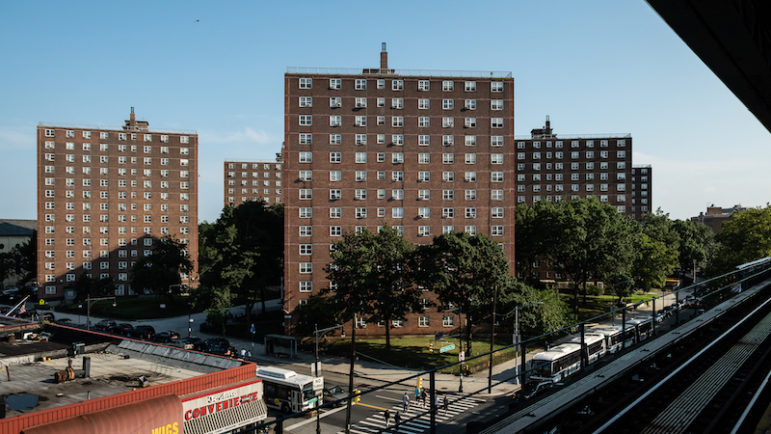The measures, signed Tuesday by Gov. Kathy Hochul, will force NYCHA to create a searchable online database of work tickets and task city agencies with making public housing code violations public.

Adi Talwar
NYCHA’s Gun Hill Houses in the Bronx.Two new state laws should soon shed more light on problems inside NYCHA’s ailing apartments and help tenants hold the housing agency accountable.
The measures, signed Tuesday by Gov. Kathy Hochul, will force NYCHA to create a searchable online database of work tickets and task city agencies with making public housing code violations public. Hochul said the two bills, which passed the Senate and Assembly last legislative session, will increase “transparency and accountability” as various reforms intended to improve conditions continue across the sprawling system.
“For too long, public housing residents in New York City have been forced to deal with unacceptable living conditions—but we’re working to make change,” she added in a statement.
NYCHA estimates that it needs $40 billion to complete capital repairs across its public housing network, home to about 400,000 New Yorkers named on leases, with perhaps 200,000 more staying in the apartments as well.
Residents who file work requests—known as tickets—often wait months without a response, only to learn their case has been closed. Queens State Sen. Jessica Ramos, who sponsored the ticket database bill, said she recalled visiting friends in the Woodside Houses as their parents struggled to get repairs done in their apartments.
“I remember having to put on sweaters to hang out with my friends because I knew they didn’t have heat and I remember some of my friends’ moms frustrated on the phone because they couldn’t get through,” Ramos said Tuesday.
READ MORE: Under New Law, NYCHA Tenants Can Log Maintenance Complaints with 311. But Advocates Want More Substantial Changes
She and Assembly sponsor Brian Barnwell said they receive an inordinate amount of complaints from residents of the Woodside Houses and other NYCHA developments. The new law compels NYCHA to have the new database up and running by Jan. 1, 2023. A NYCHA spokesperson said the agency is on track to establish the online resource by “early 2023.”
The database will enable tenants and members of the public to search for complaints by number but will exclude any identifying information, like resident’s name or apartment number. The program will also allow anyone to check what the complaint was, what the status is, what actions have been taken and what the next steps are.
Barnwell likened the idea to databases maintained by the Department of Transportation and New York City’s 311 system. Too often constituents come to him to help resolve months- or years-old problems, he said.
“What you see is delay, delay, delay,” Barnwell said. “They ignore calls and emails for months and then sometimes people give up.”
The new system will allow tenants, their advocates and elected officials to check on complaint status and identify trends, he added.
“It means having a system where at least you can go online and look up a mold complaint and see, ‘Oh, my complaint was closed I still have mold, it says no action. I better call my rep again or go back to management to say ‘What’s going on here,’” Barnwell said.
The other bill signed Tuesday by Hochul will force New York City’s Department of Housing Preservation and Development and the Department of Buildings to maintain data on code violations in public housing, the same way they do with privately-owned buildings. Assembly sponsor Marcela Mitaynes said the measure “will provide all residents and leaders with a tool that can be used to hold their housing agency accountable.”
The two new laws coincide with a commitment to foster more transparency around repairs in NYCHA apartments that was included in Mayor Eric Adams’ housing plan.
The new laws take effect as NYCHA undergoes transformation plans—controversial among many residents—to turn over property management to private companies at some campuses and to a newly created public trust in others. Both initiatives are intended to raise capital and fix woeful infrastructure, but have raised concerns about the erosion of New York City’s public housing, a foundational network of affordable homes.
NYCHA residents interviewed by City Limits say they are skeptical that the city and state will follow through on the two new accountability laws. South Jamaica Houses President Manny Martinez said the measures sound good in theory, but he worries there will be no follow-through or enforcement.
“Do I think this is going to make things better? This is NYCHA,” Martinez said. “This is just legislation to placate people if there are no consequences.”
Tasheva Gadson, a resident of the Castle Hill Houses, said past ticket system changes produced few positive results.
“The problems I have experienced with these ticket systems is that no one follows up at the appointment times, yet they close them out as if the work was done,” Gadson said. “The lack of accountability is overwhelming.”









One thought on “New York’s New NYCHA Laws Aim to Hold Agency Accountable ”
It is time to investigate weather a single group often takes over a development .
This is when that group makes access to elevators and other facilities challenging .
If an investigation shows a take over ; that development must be temporarily liquidated and a new set of tenants admitted when it is reopened .